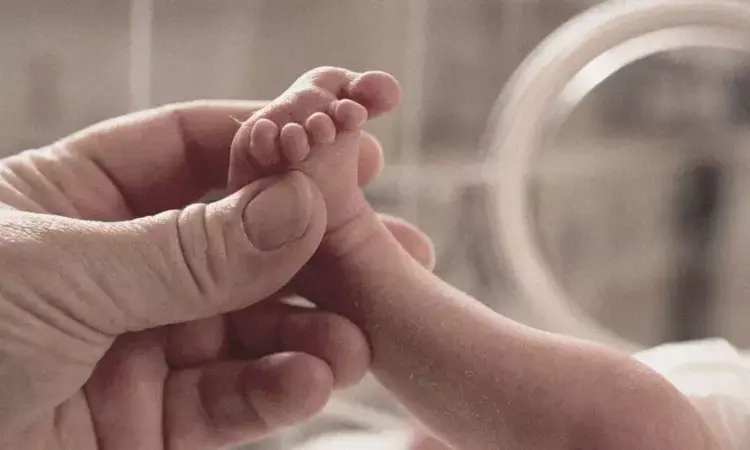- Home
- Medical news & Guidelines
- Anesthesiology
- Cardiology and CTVS
- Critical Care
- Dentistry
- Dermatology
- Diabetes and Endocrinology
- ENT
- Gastroenterology
- Medicine
- Nephrology
- Neurology
- Obstretics-Gynaecology
- Oncology
- Ophthalmology
- Orthopaedics
- Pediatrics-Neonatology
- Psychiatry
- Pulmonology
- Radiology
- Surgery
- Urology
- Laboratory Medicine
- Diet
- Nursing
- Paramedical
- Physiotherapy
- Health news
- Fact Check
- Bone Health Fact Check
- Brain Health Fact Check
- Cancer Related Fact Check
- Child Care Fact Check
- Dental and oral health fact check
- Diabetes and metabolic health fact check
- Diet and Nutrition Fact Check
- Eye and ENT Care Fact Check
- Fitness fact check
- Gut health fact check
- Heart health fact check
- Kidney health fact check
- Medical education fact check
- Men's health fact check
- Respiratory fact check
- Skin and hair care fact check
- Vaccine and Immunization fact check
- Women's health fact check
- AYUSH
- State News
- Andaman and Nicobar Islands
- Andhra Pradesh
- Arunachal Pradesh
- Assam
- Bihar
- Chandigarh
- Chattisgarh
- Dadra and Nagar Haveli
- Daman and Diu
- Delhi
- Goa
- Gujarat
- Haryana
- Himachal Pradesh
- Jammu & Kashmir
- Jharkhand
- Karnataka
- Kerala
- Ladakh
- Lakshadweep
- Madhya Pradesh
- Maharashtra
- Manipur
- Meghalaya
- Mizoram
- Nagaland
- Odisha
- Puducherry
- Punjab
- Rajasthan
- Sikkim
- Tamil Nadu
- Telangana
- Tripura
- Uttar Pradesh
- Uttrakhand
- West Bengal
- Medical Education
- Industry
Psychiatric illnesses among either of parents increase risk of preterm birth

Sweden: A recent study published in PLOS Medicine found an increased risk of premature birth in offspring born to parents with a history of psychiatric disorders.
The research shows, for the first time, that the risk of preterm birth is higher in infants whose father or mother has a psychiatric diagnosis than in those whose parents do not, and higher still when both parents have such diagnoses.
"Babies are more likely to be born prematurely when either their father or mother has had a psychiatric diagnosis," researchers at the Icahn School of Medicine at Mount Sinai and the Karolinska Institutet reported.
Preterm birth is associated with negative health consequences for infants. Women with psychiatric diagnoses have long been known to be at increased risk for preterm birth, but less is known about the risk in offspring of fathers with psychiatric diagnoses and couples where both parents had psychiatric diagnoses.
For this study, the research team analyzed data on all live births to Nordic parents (parents who were born in Sweden, Finland, Norway, Denmark and Iceland) in Sweden between 1997 and 2016. They obtained psychiatric diagnoses from the National Patient Register and data on gestational age from the Medical Birth Register.
There were 1.5 million births in the cohort, and 15 percent of those babies were born to parents with a psychiatric diagnosis. The team observed a trend towards earlier gestational age in offspring of parents with psychiatric disorders. For parents without a diagnosis, 5.8 percent of babies were born preterm. A paternal diagnosis increased that number to 6.3 percent of births and a maternal diagnosis increased it to 7.3 percent of births. Where both parents had a diagnosis, 8.3 percent of births were preterm.
The researchers also found that the risk was further increased for offspring of parents-mothers as well as fathers-who had several co-existing psychiatric disorders.
“Although the study was conducted in Sweden, if we speculate that inherited genetic risk a well as biological or psychological stress can carry over to other populations, the results are generalizable beyond Sweden. Given that roughly one in five children in the United States has at least one parent with a mental health disorder, the results of this study hold potential significance for public health,” said Sven Sandin, PhD, Associate Professor of Psychiatry and an epidemiologist at the Seaver Autism Center for Research and Treatment at Icahn Mount Sinai and senior author on the paper.
“Preterm birth can result in significant lifelong complications for the infant, and in my clinical experience, the mother has traditionally been held responsible for the events,” said Michael Silverman, PhD, Associate Professor of Psychiatry at Icahn Mount Sinai and an author on the paper. “While the gestational parent’s (the mother’s) behaviors have been historically implicated in a wide range of disorders like depression, autism, schizophrenia, and even food allergy, the non-gestational parent’s contributions have been a neglected but vital topic in the child developmental literature. This new work demonstrates that the non-gestational biologic parent’s (the father’s) psychiatric history is also associated with the increased likelihood of obstetric outcomes traditionally attributed solely to the mother.”
“Children of parents with mental illness are at increased risk of being born too early and our study shows that both the mothers and fathers are important,” says Weiyao Yin, PhD, postdoctoral researcher at the Karolinska Institutet and lead author of the paper.
Future studies should examine whether additional social support and prenatal care for families with a positive psychiatric history could have an impact on gestational age, the researchers said.
Reference:
Weiyao Yin ,Jonas F. Ludvigsson, Ulrika Åden,Kari Risnes, Martina Persson, Abraham Reichenberg, Michael E. Silverman, Eero Kajantie, Sven Sandin, Paternal and maternal psychiatric history and risk of preterm and early term birth: A nationwide study using Swedish registers, https://doi.org/10.1371/journal.pmed.1004256
Dr Kamal Kant Kohli-MBBS, DTCD- a chest specialist with more than 30 years of practice and a flair for writing clinical articles, Dr Kamal Kant Kohli joined Medical Dialogues as a Chief Editor of Medical News. Besides writing articles, as an editor, he proofreads and verifies all the medical content published on Medical Dialogues including those coming from journals, studies,medical conferences,guidelines etc. Email: drkohli@medicaldialogues.in. Contact no. 011-43720751


